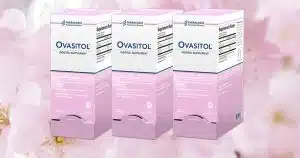I’ve recently had a lot of questions about a very important supplement and I have become more and more intrigued to look into it’s benefits myself.
So, here we go…
What about Magnesium for PCOS?
Is it a worthwhile supplement to take and how does it help?
Well, let’s answer some of those questions. But first, let’s look at what Magnesium is and what it actually does in our bodies.
Magnesium

Well, the soil that all of our plants are grown in have become depleted of Magnesium over the years. So, we’re not getting as much magnesium as we once were (2).
But what does is actually do?
Magnesium is involved in metabolism and is one of the body’s most important electrolytes. It is needed for over 300 body reactions and functions, including detoxification of toxins, regulation of blood sugar levels, relaxation of blood vessels (2).
It’s safe to say that it is pretty important!
How do I know if I’m deficient?
It can be difficult to know if you are deficient in Magnesium because most of the body’s Magnesium is stored in your bones and soft tissue, leaving only 1% of it in your blood. So, no blood test is going to be 100% reliable. Mercola.
So, what are the symptoms of Magnesium deficiency?
According to Dr Carolyn Dean, Author of The Miracle Magnesium, people deficient in Magnesium have the following symptoms:
- Anxiety and Panic attacks – Magnesium helps to keep stress hormones in check.
- Bowel disease – Magnesium deficiency slows down the movement of the gut, causing constipation which can lead to a whole other set of issues.
- Depression – Serotonin, the neurotransmitter that lifts mood, needs serotonin to function as it should.
- Diabetes and Insulin resistance – Magnesium controls insulin secretion and helps to regulate blood sugars.
- Fatigue – Magnesium deficiency can lead to improve and waining energy. This is because so many metabolic functions depend on Magnesium. Also, so many women I hear from complain of really low energy. Might a Magnesium deficiency be the answer, I wonder?
- High blood pressure – Cardiovascular disease and high blood pressure is common in PCOS. A Magnesium deficiency can cause spasming of the blood vessels, leading to high blood pressure. It also causes high cholesterol.
- Hypoglycemia – Remember that Magnesium is important in insulin secretion and regulating blood sugars? A deficiency in this important mineral can lead to drops in blood sugars.
- Insomnia – Melatonin, the sleep hormone, cannot be produced without Magnesium.
- Obstetrics and Gynecology – This is a big one for us. Magnesium helps with PMS, painful periods and is important in your fertility.
- Tooth decay – Magnesium deficiency can lead to imbalances of phosphorus and calcium in saliva, which damages teeth (I’m off to the detest as I have tooth ache so this is really making me think that I may well be deficient in Magnesium!
That’s quite a lot!
Magnesium and PCOS
Okay, so in all of my research, I didn’t find a whole lot of medical studies suggesting that Magnesium should be taken by women with PCOS.
BUT, what I did find is loads of evidence that Magnesium can be really helpful in improving insulin levels and blood sugar regulation.
Here are some examples (2):
- Magnesium deficiency was a common symptom of many pre-diabetics and supplementing with Magnesium improved blood sugar and metabolic problems by 71%
- Another study found that Magnesium supplementation slows the progression from pre-diabetes to Diabetes.
- Also, the Framingham Offspring Cohort (2006) found that those who had a higher Magnesium intake had improved insulin sensitivity and had a lower risk of Type 2 Diabetes.
Now, I know that all I’ve spoken about is Diabetes, but, remember that women with PCOS have a fundamental irregularity in insulin and glucose metabolism. We tend to release too much insulin which causes our ovaries to release too much testosterone. So, we have to get our insulin and blood sugar under control if we’re going to improve our PCOS symptoms.
And a Magnesium supplement might just help us do that.
So, which one and how much should we take?

Also, Magnesium Glycinate seems to be the one that is best absorbed and does not have any laxative effects (always helpful). Avoid Magnesium Oxide as it is poorly absorbed and can cause tummy trouble.
Epsom salt baths and Magnesium oil sprays are also helpful ways of getting your daily Magnesium.
Here are my recommendations (these are affiliate links and I may get a commission but anything that I receive goes back into the running of the site):
A supplement of Magnesium Glycinate – 2 a day…
Magnesium Oil – this is a spray that you can use directly to the skin to ease aching muscles. It is absorbed through the skin there are no tummy issues when using the spray.
Epsom salts – an Epsom salt bath is also a great way of increasing your Magnesium.
And you may well see these benefits too:
Lara Briden suggests that Magnesium can also be used to:
- Regulate cortisol
- Aid sleep
- Support your thyroid health
- Activate Vitamin D
- Make those all-important hormones
- Slow ageing
That all sounds pretty good to me!
Have you taken Magnesium and seen good results? I’d love to hear from you! Leave me a comment below!
- sustainable pcos weight loss strategies
- Over 5500 women have done it and seen results
- [bonus] Done for you pcos meal plans
- [bonus] intermittent fasting for pcos course
- [BONUS] personalised nutrition plan
JOIN OVER 5,500 OTHERS








